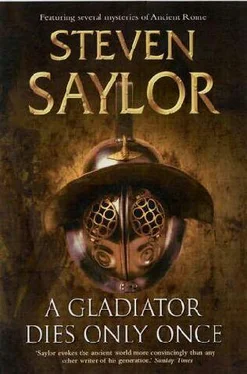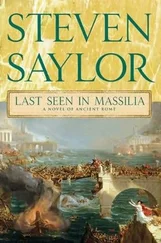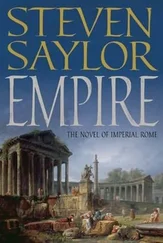Steven Saylor - A Gladiator Dies Only Once
Здесь есть возможность читать онлайн «Steven Saylor - A Gladiator Dies Only Once» весь текст электронной книги совершенно бесплатно (целиком полную версию без сокращений). В некоторых случаях можно слушать аудио, скачать через торрент в формате fb2 и присутствует краткое содержание. Жанр: Исторический детектив, на английском языке. Описание произведения, (предисловие) а так же отзывы посетителей доступны на портале библиотеки ЛибКат.
- Название:A Gladiator Dies Only Once
- Автор:
- Жанр:
- Год:неизвестен
- ISBN:нет данных
- Рейтинг книги:5 / 5. Голосов: 1
-
Избранное:Добавить в избранное
- Отзывы:
-
Ваша оценка:
- 100
- 1
- 2
- 3
- 4
- 5
A Gladiator Dies Only Once: краткое содержание, описание и аннотация
Предлагаем к чтению аннотацию, описание, краткое содержание или предисловие (зависит от того, что написал сам автор книги «A Gladiator Dies Only Once»). Если вы не нашли необходимую информацию о книге — напишите в комментариях, мы постараемся отыскать её.
A Gladiator Dies Only Once — читать онлайн бесплатно полную книгу (весь текст) целиком
Ниже представлен текст книги, разбитый по страницам. Система сохранения места последней прочитанной страницы, позволяет с удобством читать онлайн бесплатно книгу «A Gladiator Dies Only Once», без необходимости каждый раз заново искать на чём Вы остановились. Поставьте закладку, и сможете в любой момент перейти на страницу, на которой закончили чтение.
Интервал:
Закладка:
She shook her head. "How many men who look like Zanziba have you ever seen in the Roman market?"
"All the more reason why you might mistake such a fellow for your brother. Any tall, muscular man with ebony skin, glimpsed at a distance-"
"But it wasn't a glimpse! I saw him clearly-"
"You said a cart blocked the way."
"That was after I saw him, when I tried to move toward him. Be-fore that, I saw him as clearly as I'm seeing you now. I saw his face! It was Zanziba I saw!"
I considered this for a long moment. "Perhaps, Zuleika, you saw his lemur. You wouldn't be the first person to see the restless spirit of a loved one wandering the streets of Rome in broad daylight."
She shook her head. "I saw a man, not a lemur."
"But how do you know?"
"He was buying a plum from a vendor. Tell me, Gordianus: do lemures eat plums?"
I tried to dissuade her from hiring me by naming the same fee I would have asked from Cicero, but she agreed to the figure at once, and paid me a first installment on the spot. Zuleika seemed quite proud of her financial resources.
It was her idea that we should begin out search in Rome, and I agreed, duly making the rounds of the usual eyes and ears. I quickly dis-covered that a large Nubian of Zanziba's description had indeed been seen around the marketplace, but no one could identify the man and no one knew where he'd come from, or where he'd gone. Zuleika wanted to visit every hostel and tavern in the city, but I counseled pa-tience; put out a reward for information, I told her, and the information would come to us. Sure enough, a few days later, a street-sweeper in the Subura arrived at my door with word that the Nubian I was seeking had spent a single night at a seedy little hostel off the Street of the Coppersmiths, but had given no name and had moved on the next day.
Again I counseled patience. But days passed with no new in-formation, and Zuleika grew impatient to commence with the next obvious step: to pay a call on Ahala, Zanziba's lanista, the man who had turned her away when she tried to see her brother's corpse. I remained dubious, but made preparations for the journey. Ravenna is a long way from Rome, especially when the traveler suspects in his heart of hearts that at journey's end lies bitter disappointment.
Zuleika traveled with me and paid all expenses-sometimes with coins, but more often, I suspected, by exchanging favors with tavern keepers along the way, or by plying her trade with other guests. How she made her living was her business. I minded my own.
During the day, we rode on horseback. Zuleika was no stranger to horses. One of her brother's acrobatic tricks had been to stand upright on the back of a cantering horse, and she had learned to do so as well. She offered to show me, but I dissuaded her; if she fell and broke her neck, who would pay my way home?
She was a good conversationalist, a skill that no doubt con-tributed to her ability to make a decent living; men pay for pleasure, but come back for good company. To pass the hours, we talked a great deal about Alexandria, where I had lived for a while when I was young. I was amused to hear her impressions of the teeming city and its risible inhabitants. In return, I told her the tale of the Alexandrian cat, whose killer I had discovered, and the terrible revenge exacted by the cat-worshipping mob of the city.
I was also intrigued by her newcomer's impressions of Rome and Italy. Her search for Zanziba had taken her to many places, and her livelihood had acquainted her with men from all levels of society. She knew both the city and the countryside, and due to the nature of her search she had inadvertently become something of an expert on the state of gladiators.
"Do you know the strongest impression I have of this land of yours?" she said one day, as we passed a gang of slaves working in a field along the Flaminian Way. "Too many slaves!"
I shrugged. "There are slaves in Alexandria, too. There are slaves in every city and every country."
"Perhaps, but it's different here. Maybe it's because the Romans have conquered so many other people, and become so wealthy, and brought in so many slaves from so many places. In Egypt, there are small farmers all along the Nile; they may own slaves, but they also till the earth themselves. Everyone pulls together; in years of a good inundation, everyone eats well, and in years when the Nile runs low, everyone eats less. Here, it seems to me the farmers are all rich men who live in the city, and slaves do every bit of the work, and the free men who should be farmers are all in Rome, crowded into tenements and living off the dole. It doesn't seem right."
"The farms are run well enough, I suppose."
"Are they? Then why does Rome import so much grain from Egypt? Look at how these field slaves are treated-how shabbily they're dressed, how skinny they are, how hard they're made to work, even under this blistering sun. An Egyptian farmer would be out in the fields alongside his slaves, pushing them to work harder, yes, but also seeing just how hard they do work, and making sure they're healthy and well fed so they're fit to work the next day, too. To an Egyptian, slaves are a valuable investment, and you don't squander them. Here, there's a different attitude: Work a slave as hard as you can, invest as little as possible in his upkeep, and when you've used him up, dispose of him and get another, because slaves are cheap and Rome's provinces provide an endless supply."
As if to illustrate her point, we passed a huddled figure in the gut-ter alongside the road, a creature so shriveled and filthy that I could tell neither its age nor its sex-an abandoned slave, kicked out by its master, no doubt. As we passed by, the creature croaked a few unintelligible words and extended a clawlike hand. Zuleika reached into her traveling bag and threw the unfortunate a crust of bread left over from her breakfast.
"Too many slaves," she repeated. "And far too many gladiators! I can scarcely believe how many camps full of gladiators I had occasion to visit since I arrived here. So many captured warriors, from so many conquered lands, all flowing into Italy. What to do with them all? Put on gladiator games and make them fight each other to the death! Put on a show with six gladiators, and three will likely be dead by the end of the day. But ten more will arrive the next day, bought cheap at auction! Not all of them are good fighters, of course; the ones who turn out to be clumsy or cowardly or near-sighted can be sent off to a farm or a ship's galley or the mines. The ones who remain have to be outfitted and trained, and fed reason-ably well to keep them strong.
"That's how the best camps are run. But those lanistas charge a lot of money to hire out their gladiators. Not everyone can afford the best, but every Roman wants to host games at his father's funeral, even if it's only a single pair of fighters spilling each other's blood in a sheep pen while the family sit on the fence and cheer. So there's a market for gladiators who can be hired cheaply. You can imagine how those gladiators are kept-fed slop and housed in pens, like animals. But their lives are more miserable than any animal's, because animals don't fall asleep at night wondering if the next day they'll die a horrible death for a stranger's amusement. Such gladiators are poorly trained and armed with the cheapest weapons. Can you imagine a fight to the death where both men are armed with nothing better than wooden swords? There's no way to make a clean, quick kill; the result is a cruel, bloody farce. I've seen such a death match with my own eyes. I didn't know which man to pity more, the one who died, or the one who had to take the other's life using such a crude weapon."
She shook her head. "So many gladiators, scattered all over Italy, all trained to kill without mercy. So many weapons within easy reach. So much misery. I think, some day, there may be a reckoning."
Читать дальшеИнтервал:
Закладка:
Похожие книги на «A Gladiator Dies Only Once»
Представляем Вашему вниманию похожие книги на «A Gladiator Dies Only Once» списком для выбора. Мы отобрали схожую по названию и смыслу литературу в надежде предоставить читателям больше вариантов отыскать новые, интересные, ещё непрочитанные произведения.
Обсуждение, отзывы о книге «A Gladiator Dies Only Once» и просто собственные мнения читателей. Оставьте ваши комментарии, напишите, что Вы думаете о произведении, его смысле или главных героях. Укажите что конкретно понравилось, а что нет, и почему Вы так считаете.










